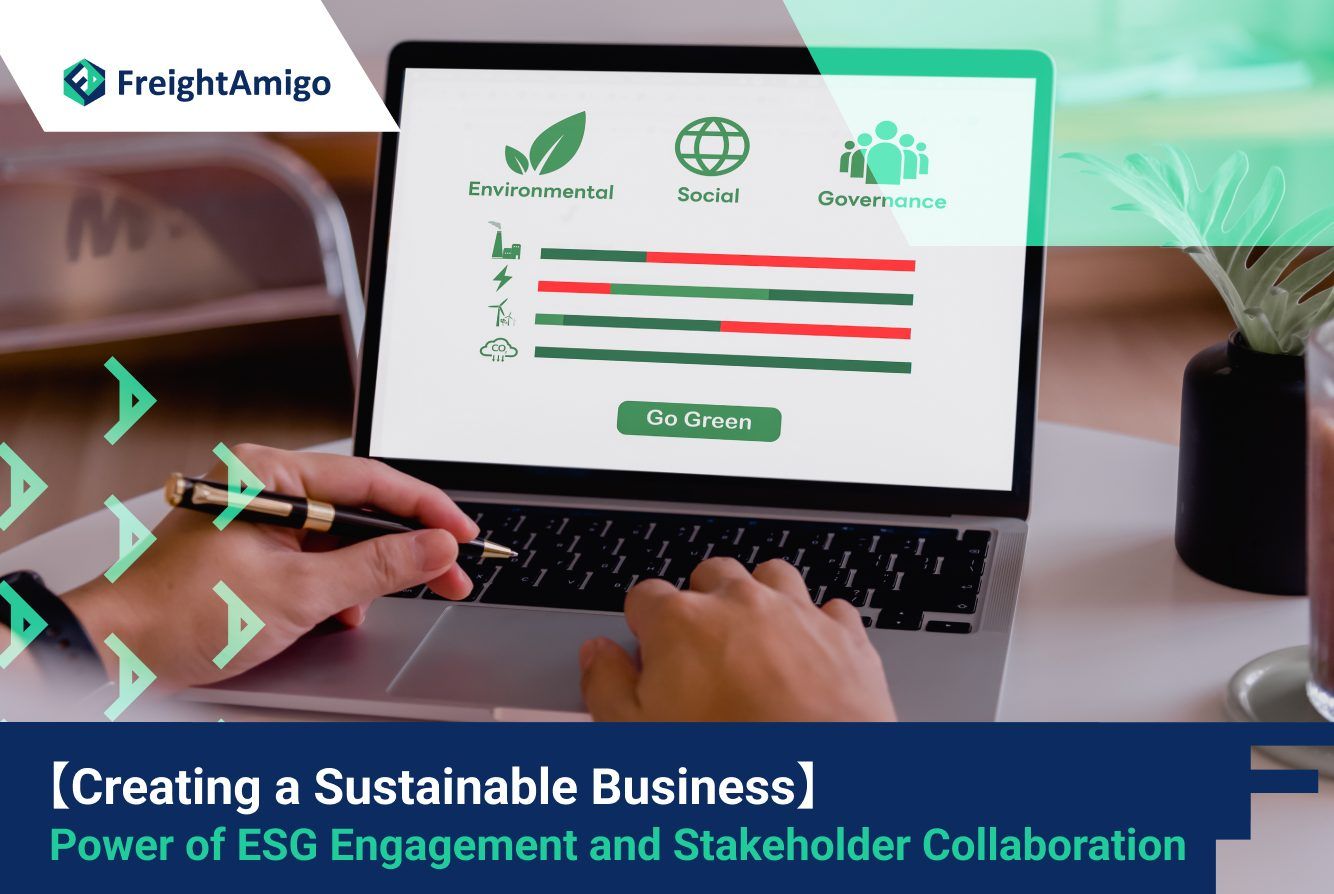Author: Emma Hau
Published: November 30, 2025
Updated: February 25, 2026
Creating a Sustainable Logistics Business: ESG Engagement and Stakeholder Collaboration in 2025
TL;DR: Discover how ESG engagement and stakeholder collaboration drive sustainable logistics businesses in 2025, with actionable steps for reducing emissions, optimizing supply chains, and boosting profitability through green practices.
Author: Tiffany Lee – Marketing Analyst at FreightAmigo
Updated: 2025-10-27
What is ESG Engagement in Sustainable Logistics?
ESG engagement is transforming logistics by integrating environmental, social, and governance factors into core operations for long-term viability.
In 2025, logistics firms prioritize ESG to meet rising demands for low-carbon shipping amid global regulations like the IMO's 2025 sulfur cap updates.
- Environmental: Cuts emissions via electric fleets and biofuels.
- Social: Enhances worker safety and community ties.
- Governance: Ensures ethical sourcing and transparent reporting.
Why Stakeholder Collaboration Powers Sustainable Business in Logistics
**Stakeholder collaboration in logistics creates shared value, aligning suppliers, carriers, and regulators for greener supply chains.
Logistics stakeholders—from shippers to ports—co-create solutions like collaborative routing to slash fuel use by 20% in 2025 pilots.
- Suppliers provide eco-materials.
- Customers demand traceable shipments.
- Governments enforce carbon taxes.
- Investors fund green tech.
How to Implement ESG Practices in Logistics Operations (2025 Guide)
Start with a 2025 ESG audit tailored to logistics to benchmark carbon footprints and compliance.
Logistics leaders use digital twins for real-time sustainability tracking, reducing Scope 3 emissions effectively.
- Assess fleet emissions with AI tools.
- Set net-zero targets aligned with 2025 national policies.
- Integrate ESG into vendor contracts.
- Monitor via blockchain for transparency.
- Report using 2025 WCO guidelines.
Steps to Build Eco-Friendly Logistics Supply Chains
**Building sustainable logistics supply chains demands strategic shifts toward circular models in 2025.
Adopt multimodal transport to optimize routes, cutting costs and emissions as per recent EU green corridor initiatives.
| Step | Action | 2025 Impact |
|---|
| 1. Route Optimization | AI-driven planning | 15% fuel savings |
| 2. Green Fuels | Biofuel adoption | 40% emission drop |
| 3. Packaging | Reusable materials | 30% waste reduction |
| 4. Partnerships | Stakeholder alliances | Enhanced compliance |
| 5. Metrics | KPI dashboards | Real-time tracking |
ESG Challenges in Logistics and 2025 Solutions
Logistics faces ESG hurdles like high emissions and supply disruptions, but 2025 tech resolves them efficiently.
Massive national changes in 2025, including China's green belt mandates, demand adaptive strategies.
- Challenge: Cost of green tech – Solution: Government subsidies.
- Challenge: Data silos – Solution: API integrations.
- Challenge: Regulation flux – Solution: Agile compliance tools.
- Regulatory complexity amid no major WCO revisions until 2027.
- Stakeholder buy-in via co-innovation hubs.
2025 Case Study: Sustainable Logistics Success
A major Asian logistics firm cut emissions 25% in 2025 through ESG-stakeholder partnerships.
By collaborating with ports and using predictive analytics, they optimized intermodal shifts, per WCO-cited reports.
- Implemented shore power at docks.
- Trained 5,000 staff on ESG.
- Achieved 18% cost savings.
Sustainability Metrics for Logistics Businesses in 2025
**Track key ESG KPIs to measure sustainable logistics progress amid 2025 regulatory shifts.
Use these metrics for stakeholder reporting:
| Metric | Target 2025 | Benefit |
|---|
| Carbon Intensity | <50gCO2/tkm | Compliance |
| Renewable Energy % | 30% | Cost savings |
| Diversity Index | 40% inclusive hires | Talent retention |
FAQ: ESG Engagement and Stakeholder Collaboration in Sustainable Logistics
Quick answers to top questions on building sustainable logistics businesses.
- What is ESG in logistics? ESG integrates environmental impact, social responsibility, and governance into logistics for sustainability.
- Why collaborate with stakeholders in 2025? It aligns supply chains with regulations and reduces costs through shared innovations.
- How to start ESG in logistics? Conduct an audit, set goals, and partner with green suppliers.
- What are 2025 logistics sustainability trends? Electrification, biofuels, and AI optimization dominate.
- Does ESG boost logistics profitability? Yes, via efficiency gains and premium green pricing.
- How to measure logistics ESG success? Track emissions, waste, and diversity KPIs quarterly.
- What challenges face sustainable logistics? High upfront costs, solved by phased investments.
- Role of governance in ESG logistics? Ensures ethical practices and transparent reporting.
- Stakeholder examples in logistics ESG? Ports, carriers, and NGOs co-develop green corridors.
- Future of sustainable logistics post-2025? Net-zero by 2030 via tech and collaboration.
Resources for Sustainable Logistics
For expert support in ESG-driven logistics, consider tools like FreightAmigo's platform. Book a Demo to optimize rates and sustainability.
Contact: HKG: +852 24671689 | CHN: +86 4008751689 | USA: +1 337 361 2833 | Email: enquiry@freightamigo.com

